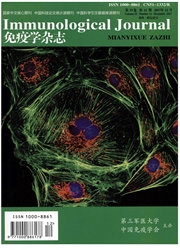

 中文摘要:
中文摘要:
Objective: To study the expression of caspase-3 and tumor necrosis factor-related apoptosisinducing ligand (TRAIL) receptors in the CD4+ and CD8+ T cells of systemic lupus enythematosus (SLE) patients. Methods: RT-PCR was used to analyze the expression of caspase-3 and TRAIL receptors in CD4+ and CD8+ T cells of SLE patients and normal subjects. Results: The death domain-containing TRAIL-R1/R2 as well as 'decoy' TRAIL-R3/R4 were co-expressed in majority of CD4+ and CD8+ T cells in both SLE patients and normal subjects. The CD8+ T cells from SLE patients showed significantly higher expression of caspase-3 and TRAIL-R2 than those from normal subjects,and the expression was correlated with the activity of the disease. Conclusion: The TRAIL-R2 signal pathway might contribute to the apoptosis of T cells in SLE.
 英文摘要:
英文摘要:
Objective: To study the expression of caspase-3 and tumor necrosisfactor-related apoptosis-inducing ligand (TRAIL) receptors in the CD4~+ and CD8~+ T cells ofsystemic lupus enythematosus (SLE) patients. Methods: RT-PCR was used to analyze the expression ofcaspase-3 and TRAIL receptors in CD4~+ and CD8~+ T cells of SLE patients and normal subjects.Results: The death domain-containing TRAIL-R1/R2 as well as ''decoy'' TRAIL-R3/R4 were co-expressed inmajority of CD4~+ and CD8~+ T cells in both SLE patients and normal subjects. The CD8~+ T cellsfrom SLE patients showed significantly higher expression of caspase-3 and TRAIL-R2 than those fromnormal subjects, and the expression was correlated with the activity of the disease. Conclusion: TheTRAIL-R2 signal pathway might contribute to the apoptosis of T cells in SLE.
 同期刊论文项目
同期刊论文项目
 同项目期刊论文
同项目期刊论文
 期刊信息
期刊信息
